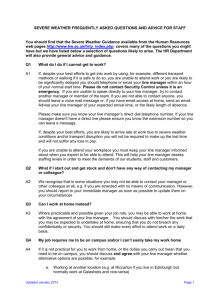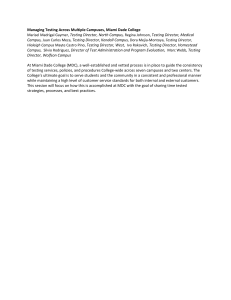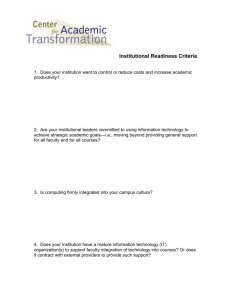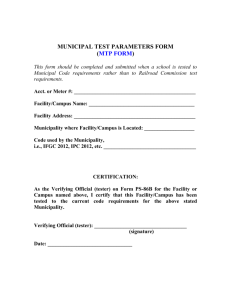FAQS Guidance for Staff Severe Weather - Heriot
advertisement
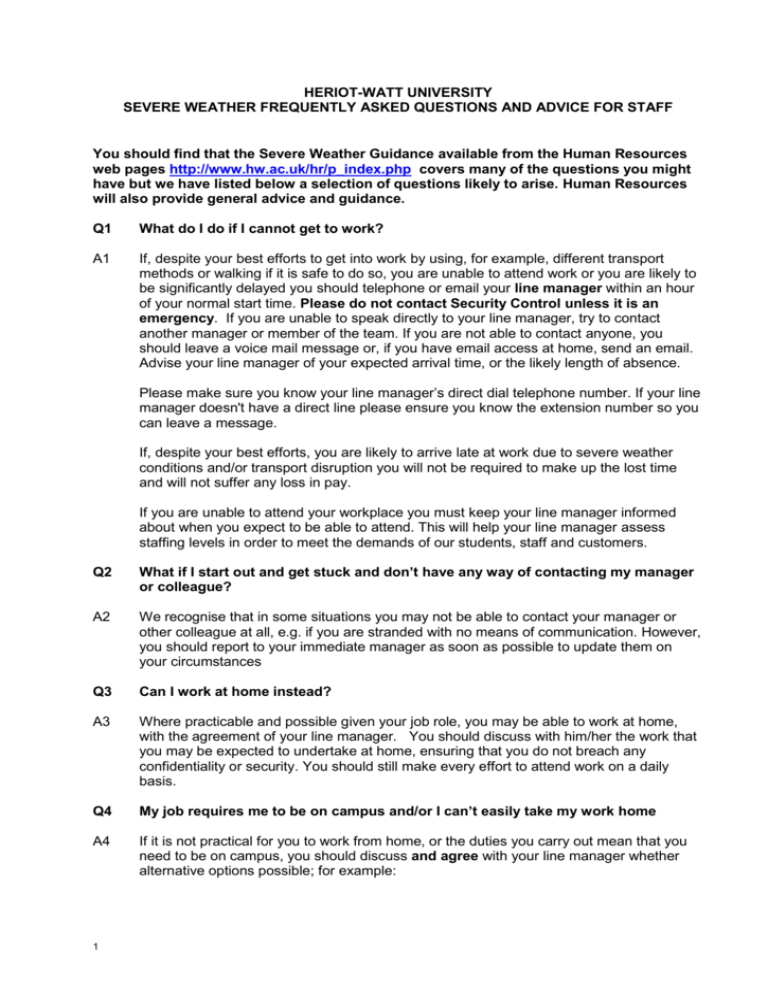
HERIOT-WATT UNIVERSITY SEVERE WEATHER FREQUENTLY ASKED QUESTIONS AND ADVICE FOR STAFF You should find that the Severe Weather Guidance available from the Human Resources web pages http://www.hw.ac.uk/hr/p_index.php covers many of the questions you might have but we have listed below a selection of questions likely to arise. Human Resources will also provide general advice and guidance. Q1 What do I do if I cannot get to work? A1 If, despite your best efforts to get into work by using, for example, different transport methods or walking if it is safe to do so, you are unable to attend work or you are likely to be significantly delayed you should telephone or email your line manager within an hour of your normal start time. Please do not contact Security Control unless it is an emergency. If you are unable to speak directly to your line manager, try to contact another manager or member of the team. If you are not able to contact anyone, you should leave a voice mail message or, if you have email access at home, send an email. Advise your line manager of your expected arrival time, or the likely length of absence. Please make sure you know your line manager’s direct dial telephone number. If your line manager doesn't have a direct line please ensure you know the extension number so you can leave a message. If, despite your best efforts, you are likely to arrive late at work due to severe weather conditions and/or transport disruption you will not be required to make up the lost time and will not suffer any loss in pay. If you are unable to attend your workplace you must keep your line manager informed about when you expect to be able to attend. This will help your line manager assess staffing levels in order to meet the demands of our students, staff and customers. Q2 What if I start out and get stuck and don’t have any way of contacting my manager or colleague? A2 We recognise that in some situations you may not be able to contact your manager or other colleague at all, e.g. if you are stranded with no means of communication. However, you should report to your immediate manager as soon as possible to update them on your circumstances Q3 Can I work at home instead? A3 Where practicable and possible given your job role, you may be able to work at home, with the agreement of your line manager. You should discuss with him/her the work that you may be expected to undertake at home, ensuring that you do not breach any confidentiality or security. You should still make every effort to attend work on a daily basis. Q4 My job requires me to be on campus and/or I can’t easily take my work home A4 If it is not practical for you to work from home, or the duties you carry out mean that you need to be on campus, you should discuss and agree with your line manager whether alternative options possible; for example: 1 a. b. c. d. e. f. g. Working at another location (e.g. at Riccarton if you live in Edinburgh but normally work at Galashiels and vice-versa) Making up any lost time on a later day or days Using annual leave (if this is agreed, you should record this on iHR through Employee Self-Service and your manager will then approve it) Taking unpaid leave (if this is agreed, you should record this on iHR through Employee Self-Service and your manager will then approve it) Considering sharing transport with colleagues Agreeing different start and finish times (if possible) with your manager A combination of options The most appropriate alternative for you may not be an appropriate option for other members of your team or other staff in the University so there are no hard and fast rules about which option should apply at any given time; it will depend on the severity of the weather, the likely duration of the weather and the personal circumstances of each person. Q5 What if I cannot get to work due to personal or domestic reasons? A5 In all circumstances, you should contact your Line Manager within an hour of your normal starting time and advise them of the situation. If, regardless of the state of the weather or transport, you are not well enough to come to work, the Sickness Absence Policy will apply. If you would normally be well enough or fit enough to attend work but the weather or transport makes it more difficult for you, you should let your Line Manager know so that s/he can consider whether alternative arrangements may be made in the short term. If you are unable to attend work because, for example, Schools or Nurseries are closed or you have no means of getting your children to school, or you have to care for someone dependent on you, the Emergency Dependents’ Leave Policy would apply. You can find details of the relevant policies by visiting the following links Severe Weather Guidance http://www.hw.ac.uk/hr/htm/policies/Severe%20Weather%20Guidance%20for%20Staff%2 0approved%20at%20IB%20190110.doc Sickness Absence Policy http://www.hw.ac.uk/hr/p_sickness_absence.php Emergency Dependants Leave http://www.hw.ac.uk/hr/htm/policies/Emergency%20Leave%20policy.doc Q6 Can my manager insist I take annual leave? A6 Managers will have to make decisions based on a combination of factors, including whether it is possible to work effectively from home and how long the severe weather has lasted. Whilst we would not expect employees to have to take annual leave from the very first day that the severe weather starts, if there are no other suitable options for you (see 2 Q4 above) or if the severe weather lasts more than a few days, asking you to take annual leave is a reasonable request to make. All annual leave should be entered on iHR. Q7 Why can some people work from home but others are expected to come into work or have to make up time – that doesn’t seem fair! A7 Some employees have jobs that mean they are able to work effectively at home, for example, if their job is largely desk-bound and they have access to email, folders, documents etc. The manager should agree in advance that working from home is suitable and also agree the expected work and outputs. Where employees are able to work from home and this is agreed, it will also reduce the numbers of people coming onto campus in poor weather/driving/parking conditions. Other members of staff will not be able to work at home because their job has to be done on the campus; for example, preparing and serving food, cleaning; or they may not have the tools to be able to work at home; for example if an employee working in an office does not have access to a computer/email at home. In these situations, managers will be expected to discuss with their teams the most appropriate solution for each individual. Q8 My manager has agreed that different members of the team can be treated differently – surely that can’t be right? A8 Line Managers will have to make decisions based on a number of factors, some of which will be personal to each individual. They will have to consider, for example, child care responsibilities and access to emergency child care support; where an individual lives and how s/he usually travels to work; whether s/he is able to work effectively at home; whether s/he is able to change their travel method; there may be any number of factors that apply to some members of the team and not to others. It would be more unfair to insist that all members of the team are treated exactly the same as that might have more of an impact on some members of the team than others. Q9 If the weather lasts for an extended period of time, at what stage can my manager tell me I must take annual leave? A9 Again, there are no hard and fast rules to apply. It will depend on a number of factors including whether you are able to work effectively at home, or alternative options are suitable. The University has not at this stage made a decision to say “After [so many] days of poor weather, you must take annual leave” Q10 What if I don’t have any leave left to take? A10 It is more likely that severe weather will occur during the winter months, towards the beginning of the holiday year (which starts in October) so most people should have plenty of leave to use. However, if you are on a fixed term contract which is nearing the end and you have used up most or all of your leave; or if there are other reasons for not being able to attend work (such as an ash cloud!) towards the end of the leave year, then you should discuss alternative solutions with your manager. You may be able to make up time later on; or take unpaid leave; or “borrow” leave from the next leave year (if this is applicable). Unpaid leave should be recorded on iHR. If you agree to “borrow” leave from the next leave year, your manager should contact the HR Admin team for advice on how to log this in iHR. 3 Q11 What happens if severe weather conditions occur or continue during the working day? A11 If severe weather conditions develop or do not improve during the course of the working day and it is likely to make your journey home difficult or very lengthy, you should discuss with your manager whether it is possible to leave campus earlier than usual. Advice regarding road conditions can be sought from announcements by the Police on local radio stations and news websites such as BBC and STV Scotland. Some useful web links to assist you can be found below: http://www.bbc.co.uk/news/scotland/ http://news.stv.tv/ http://www.edinburgh.gov.uk/winterweather http://www.readyscotland.org/ Twitter @edintravel http://www.lothianbuses.com/ http://www.mybustracker.co.uk/ http://trafficscotland.org/ http://www.journeycheck.com/firstscotrail http://www.firstgroup.com/ukbus/scotland_east/travel_news/service_updates/?item =711&conf=1 http://www.westlothian.gov.uk//Council_and_government/Winterready/ http://www.eastlothian.gov.uk/site/index.php http://www.firstgroup.com/ukbus/scotland_east/travel_news/service_updates/ http://www.scotrail.co.uk/content/travel-updates Q12 What if I can’t park in my usual car park because of snow or ice? A12 You must not park on the roads during severe weather. It is imperative that emergency vehicles can access all areas of the University campus. Estates Services will provide advice regarding the location of parking for staff, students and visitors which will be set out in the communications issued by Marketing and Communications. Q13 What do I need to do if I need to travel on University business? A13 University business travel should be kept to a minimum or avoided totally during adverse weather conditions. You should actively consider using University facilities, such as email, Skype and video conferencing (where available). You should amend your diary commitments to ensure that, wherever possible, only essential journeys are made. All other non-essential meetings should be postponed. If in doubt, consult your line manager. Likewise, you should consider alternative arrangements if you are hosting a meeting, especially if the weather conditions are worse around the campus than elsewhere. For example, Riccarton campus might be easy to access when the roads around Galashiels are difficult to travel on. Q14 Will I be able to drive a University owned, hire or leased vehicle? A14 University business travel should either be kept to a minimum or avoided totally during adverse weather conditions. Full use should be made of University facilities, such as email and video conferencing (where available) to assist with the reduction of travelling commitments. 4 Staff should amend their diary commitments to ensure that only essential journeys are made. All other non-essential meetings should be postponed. If in doubt, staff should consult their Line Manager. Staff travelling on essential journeys, should ensure that they are experienced drivers in difficult conditions, properly equipped and, where possible, have access to a mobile telephone (but not for use while actually driving). You should discuss the proposed trip with your Line Manager and details should be left with the Line Manager as to the journey(s) to be undertaken and the proposed route which will be used. Contact should be maintained with your Line Manager. Staff are required to ensure that they have the recommended emergency equipment in the vehicle as advised by the Scottish Government which can be found by visiting http://www.readyscotland.org/travel/emergency-travel-kit/ No minibuses will be available for hire during periods of severe weather conditions. Borders Campus Minibus - The minibus which operates from the Borders Campus to Riccarton may be suspended in the event of severe weather conditions. Staff responsible for the operation of the minibus service will communicate with staff at the Borders Campus in the event that the service is suspended. Students and Staff should contact their Line Manager for advice and guidance on their specific circumstances but in general the advice set out in the Severe Weather Policy and these FAQ’s would apply. 5 GENERAL HEALTH & SAFETY ADVICE/INFORMATION: SNOWY CONDITIONS University Buildings, Grounds and Car Parks: Riccarton Campus The Estate Service is responsible for ensuring appropriate gritting and clearing of the Riccarton Campus. However, should staff encounter any problems they should report these to Security Control on extension 3500. Please be mindful, though, that the Estates staff will be working to a plan that ensures most popular routes or higher-risk areas such as around the nursery are cleared first and that it is not possible to clear every road, path or car-park at the same time! Public roads and footpaths remain the responsibility of the local authority and may present a greater hazard so care should be taken. Borders College The Borders College is responsible for the clearance of the grounds and car parks at Galashiels. The contingency plan provided by Borders College can be found in Appendix 1. Every effort will be made to ensure that buildings are operational (heat, light and power). If staff have concerns about the temperature of their working space they should refer to their line manager in the first instance. Car Parking Staff must only park in designated car parks. The University will advise staff of the location of safe car parking areas during severe weather. The University must ensure that emergency vehicles can access and egress all areas of the University safely. Staff at the Borders Campus must comply with the parking arrangements issued by the Facilities’ Manager, Borders College. The University does not accept responsibility or liability for any vehicle which is damaged as a result of being parked on the roadway. We ask that you take special precautions when driving to and from work and moving around campus. These include: Be prepared - follow our top tips and advice Wear the best shoes you have that have good grip and are waterproof. Make sure you have multiple layers of clothing in the car in case you get stuck - the temperature can drop very quickly in a car. Gloves are important - they won't just keep your hands warm as if you do fall over, they will offer some protection. Keep your mobile phone charged and bring food and preferably a hot drink. If you are unsure about what to do, please speak to your line manager. Above all take care and stay safe. 6 Driving Before starting your journey listen to local travel news, and assess whether it is safe to travel by car. Continue to listen to travel bulletins during your journey. Please refer to the following web link for guidance http://www.readyscotland.org/travel/emergency-travel-kit/ We recommend you give consideration to the points below and take the following actions: Is it essential you travel by car? Is public transport available? Assess the road conditions. If necessary delay your journey, take a different route which you know is salted or kept clear Allow extra travelling time Take extra care when driving Use your local knowledge to anticipate where there might be hold ups or ice on the roads Ensure your fuel tank is at least half full Make sure the car/vehicle is in good condition for the journey (tyres, oil, coolant, windscreen washer etc) Reduce your travelling speed Take warm clothes with you Take something to drink (hot if possible) and something to eat Keep your mobile telephone charged in case you need it Take Wellingtons (or other sensible shoes) Take something to move snow away from your tyres Take a torch Put a spade in your boot Consider fitting winter snow tyres to your car If possible, consider waiting until roads have been gritted before travelling. Listen to the news and the advice issued by the Police. Avoid driving, if possible – consider using public transport to get to work. Walking Don’t walk to work if the conditions are dangerous or hazardous. Please consider any existing medical conditions or disability when making your assessment. Take your time and be careful when walking on footpaths, particularly if untreated, or if partly treated and remember to wear sensible warm footwear Be careful when moving from one surface to another, e.g. alighting from a bus or road onto a pavement or on a sloping surface Use gritted/salted walkways where possible Keep warm, wear warm clothes, gloves, scarves and hats Make sure you have a charged mobile phone so you can contact someone if you have difficulties. Wear warm clothes and suitable footwear Additional Information and useful resources The City Of Edinburgh Council have reviewed their severe weather arrangements and have made several significant changes to their path and road clearance programme around the City of Edinburgh which includes improved clearance of the areas surrounding the University. Further information can be found by visiting their web pages at http://www.edinburgh.gov.uk/winterweather 7


